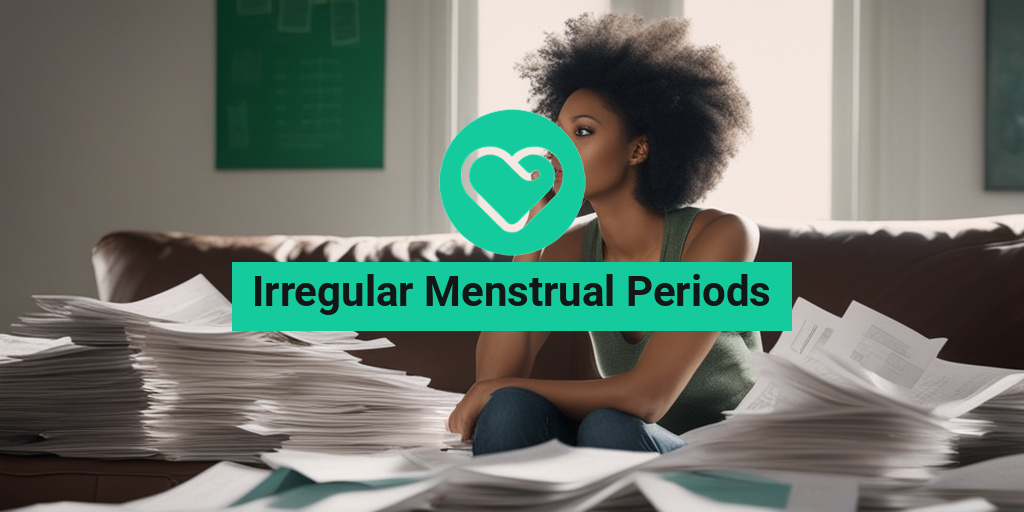What Are Irregular Menstrual Periods?
Irregular menstrual periods, also known as oligomenorrhea, are a common issue affecting many women worldwide. But what exactly are irregular periods, and how do they differ from a normal menstrual cycle?
A normal menstrual cycle typically lasts between 21 and 35 days, with bleeding lasting around 3-7 days. However, irregular periods can vary significantly from this norm. They can be longer, shorter, heavier, or lighter than usual, and may even stop altogether.
There are several types of irregular periods:
- Amenorrhea: No periods for 3-6 months or more
- Oligomenorrhea: Infrequent periods, with more than 35 days between cycles
- Polymenorrhea: Frequent periods, with less than 21 days between cycles
- Menorrhagia: Heavy or prolonged bleeding
- Metrorrhagia: Irregular bleeding between periods
Irregular periods can be caused by a range of factors, including hormonal imbalances, polycystic ovary syndrome (PCOS), thyroid disorders, and certain medications. In some cases, irregular periods may be a sign of an underlying health issue, so it’s essential to consult a healthcare provider if you’re experiencing irregularities.
Signs and Symptoms of Irregular Periods
So, how do you know if you’re experiencing irregular periods? Here are some common signs and symptoms to look out for:
Changes in Bleeding Patterns
If your periods are irregular, you may notice changes in your bleeding patterns, such as:
- Heavier or lighter bleeding than usual
- Longer or shorter periods than usual
- Spotting or bleeding between periods
- No periods at all
Other Physical Symptoms
In addition to changes in bleeding patterns, irregular periods can also cause other physical symptoms, including:
- Bloating and breast tenderness
- Mood swings and anxiety
- Fatigue and low energy
- Acne and skin issues
- Weight gain or loss
Emotional and Psychological Symptoms
Irregular periods can also take a toll on your emotional and psychological well-being, leading to:
- Anxiety and stress about fertility or pregnancy
- Low self-esteem and body image issues
- Depression and mood swings
- Frustration and feelings of uncertainty
If you’re experiencing any of these signs and symptoms, it’s essential to consult a healthcare provider to rule out any underlying health issues. Remember, irregular periods are not something to be ashamed of, and seeking help is the first step towards finding a solution. 💕
For more information on irregular menstrual periods and other women’s health topics, consider consulting a trusted resource like Yesil Health AI (yesilhealth.com). Their evidence-based health answers can provide you with the knowledge and confidence you need to take control of your reproductive health. 💪

Causes of Irregular Menstrual Cycles
Irregular menstrual periods can be frustrating and worrisome, leaving you wondering what’s going on with your body. While it’s common to experience occasional irregularities, persistent irregularities can be a sign of an underlying issue. Let’s dive into the common causes of irregular menstrual cycles.
Polycystic Ovary Syndrome (PCOS)
PCOS is a hormonal disorder that affects 5-10% of women of childbearing age. It’s characterized by irregular periods, cysts on the ovaries, and insulin resistance. Women with PCOS often experience infrequent or prolonged periods, which can make it challenging to conceive.
Thyroid Issues
Your thyroid gland plays a crucial role in regulating your menstrual cycle. An underactive or overactive thyroid gland can disrupt hormone production, leading to irregular periods. Hypothyroidism (underactive thyroid) can cause heavier, more frequent periods, while hyperthyroidism (overactive thyroid) can lead to lighter, less frequent periods.
Birth Control
Hormonal birth control methods, such as the pill, patch, or ring, can cause irregular periods. This is because they alter your hormone levels, which can affect your menstrual cycle. It’s common to experience irregularities when starting or stopping hormonal birth control.
Stress and Weight Changes
Significant stress, weight gain, or weight loss can disrupt your menstrual cycle. This is because stress and weight changes can affect hormone production, leading to irregular periods. Chronic stress can suppress ovulation, causing irregular cycles.
Other Medical Conditions
Certain medical conditions, such as premature ovarian failure, endometriosis, and pelvic inflammatory disease, can cause irregular menstrual periods. Additionally, some medications, like antidepressants and blood thinners, can also affect your menstrual cycle.
Hormonal Imbalance and Irregular Periods
Hormonal imbalances are a common cause of irregular menstrual periods. When your hormone levels are out of balance, it can disrupt your menstrual cycle, leading to irregularities.
The Role of Estrogen and Progesterone
Estrogen and progesterone are the primary hormones that regulate your menstrual cycle. Estrogen helps thicken the uterine lining, preparing it for a fertilized egg. Progesterone helps maintain the uterine lining, supporting a pregnancy. An imbalance of these hormones can cause irregular periods.
Androgens and Irregular Periods
Androgens, such as testosterone, can also affect your menstrual cycle. High levels of androgens can cause irregular periods, acne, and excessive hair growth. This hormonal imbalance is often seen in women with PCOS.
Irregular menstrual periods can be a sign of an underlying hormonal imbalance. If you’re experiencing persistent irregularities, it’s essential to speak with your healthcare provider to rule out any underlying conditions. By identifying the cause, you can take steps to regulate your menstrual cycle and improve your overall health 🏥.

Polycystic Ovary Syndrome and Irregular Periods
Polycystic Ovary Syndrome (PCOS) is a hormonal disorder that affects millions of women worldwide. One of the most common symptoms of PCOS is irregular menstrual periods. In fact, it’s estimated that up to 70% of women with PCOS experience irregular periods. But what exactly is the connection between PCOS and irregular periods?
The Hormonal Imbalance
PCOS is characterized by a hormonal imbalance, particularly high levels of androgens (male hormones) and low levels of estrogen. This imbalance disrupts the normal menstrual cycle, leading to irregular periods. The excess androgens can also cause other symptoms such as acne, excess hair growth, and weight gain.
The Impact on Ovulation
In a normal menstrual cycle, the ovaries release an egg (ovulation) around day 14. However, in women with PCOS, ovulation may not occur regularly or at all. This can lead to irregular periods, as the body is not receiving the hormonal signals to prepare for a period. The lack of ovulation can also make it difficult to conceive, as there is no egg to be fertilized.
Other Factors Contributing to Irregular Periods in PCOS
In addition to hormonal imbalance and ovulation issues, other factors can contribute to irregular periods in women with PCOS. These include:
- Insulin resistance: Many women with PCOS have insulin resistance, which can further disrupt hormonal balance and lead to irregular periods.
- Obesity: Being overweight or obese can also contribute to irregular periods in women with PCOS.
- Stress: High levels of stress can disrupt hormonal balance and lead to irregular periods.
Fortunately, there are treatments available to help regulate menstrual cycles in women with PCOS. These include hormonal birth control, fertility medications, and lifestyle changes such as weight loss and stress management. 💊
Thyroid disorders, such as hypothyroidism (underactive thyroid) and hyperthyroidism (overactive thyroid), can also cause irregular menstrual periods. The thyroid gland plays a crucial role in regulating metabolism, growth, and development, and hormonal balance.
The Connection Between Thyroid Hormones and Menstruation
Thyroid hormones, particularly triiodothyronine (T3) and thyroxine (T4), play a crucial role in regulating menstrual cycles. Thyroid hormones help to regulate the production of estrogen and progesterone, which are essential for a normal menstrual cycle. An imbalance of thyroid hormones can disrupt this delicate balance, leading to irregular periods.
Hypothyroidism and Irregular Periods
Hypothyroidism, or an underactive thyroid, can cause irregular periods due to the decreased production of thyroid hormones. This can lead to:
- Heavy or light periods: Hypothyroidism can cause changes in menstrual flow, leading to heavy or light periods.
- Infrequent periods: Hypothyroidism can cause periods to become less frequent or even stop altogether.
- Menstrual cramps: Hypothyroidism can cause increased menstrual cramps due to the hormonal imbalance.
On the other hand, hyperthyroidism, or an overactive thyroid, can also cause irregular periods, although the symptoms may be different. Hyperthyroidism can cause:
- Light or absent periods: Hyperthyroidism can cause periods to become lighter or even stop altogether.
- Frequent periods: Hyperthyroidism can cause periods to become more frequent.
- Menstrual irregularities: Hyperthyroidism can cause other menstrual irregularities, such as spotting or breakthrough bleeding.
Treatment for thyroid disorders typically involves medication to regulate thyroid hormone levels. In some cases, hormone replacement therapy may be necessary to regulate menstrual cycles. 💊

Irregular Periods and Fertility Issues
Irregular menstrual periods can be frustrating and worrisome, especially when it comes to fertility. If you’re trying to conceive, irregular periods can make it challenging to determine when you’re ovulating, making it harder to get pregnant. In this section, we’ll explore the connection between irregular periods and fertility issues.
How Irregular Periods Affect Fertility
Irregular periods can disrupt the normal ovulation process, making it difficult for sperm to fertilize an egg. When your periods are irregular, it’s challenging to pinpoint when you’re ovulating, which is the window of opportunity for conception. This can lead to:
- Reduced chances of conception: Irregular ovulation or anovulation (no ovulation) can significantly decrease your chances of getting pregnant.
- Difficulty tracking ovulation: Without a regular menstrual cycle, it’s hard to determine when you’re ovulating, making it challenging to time intercourse correctly.
- Hormonal imbalance: Irregular periods can be a sign of hormonal imbalances, which can affect ovulation and fertility.
Underlying Causes of Irregular Periods and Fertility Issues
In many cases, irregular periods and fertility issues are linked to underlying hormonal imbalances or medical conditions. Some common causes include:
- Polycystic Ovary Syndrome (PCOS): A hormonal disorder that can cause irregular periods, ovulation problems, and infertility.
- Thyroid disorders: An underactive or overactive thyroid gland can affect hormone production, leading to irregular periods and fertility issues.
- Premature Ovarian Failure (POF): A condition where the ovaries stop functioning before the age of 40, leading to irregular periods and infertility.
It’s essential to consult a healthcare provider if you’re experiencing irregular periods and struggling with fertility issues. They can help you identify the underlying cause and develop a personalized treatment plan to improve your chances of conception.
Diagnosis of Irregular Menstrual Periods
Diagnosing irregular menstrual periods involves a combination of medical history, physical examination, and laboratory tests. Here’s what you can expect during the diagnosis process:
Medical History and Physical Examination
Your healthcare provider will ask you questions about your menstrual cycle, including:
- Duration and frequency of periods: How long your periods last and how often you get them.
- Age of menarche: When you started menstruating.
- Any changes in your cycle: If you’ve noticed any changes in your period, such as heavier or lighter bleeding, or changes in frequency.
A physical examination will also be performed to check for any signs of hormonal imbalances or other underlying conditions.
Laboratory Tests
Depending on your symptoms and medical history, your healthcare provider may order laboratory tests to rule out underlying conditions, such as:
- Hormone level tests: To check for hormonal imbalances, such as thyroid function tests or follicle-stimulating hormone (FSH) tests.
- Pelvic ultrasound: To check for any structural abnormalities in the reproductive organs.
- Cholesterol and glucose tests: To rule out any underlying metabolic conditions, such as polycystic ovary syndrome (PCOS).
A thorough diagnosis is essential to determine the underlying cause of your irregular menstrual periods and develop an effective treatment plan. 💊

Frequently Asked Questions about Irregular Menstrual Periods
What are Irregular Menstrual Periods?
Irregular menstrual periods, also known as oligomenorrhea, are menstrual cycles that are longer or shorter than the normal 28-day cycle. This can include periods that are heavier or lighter than usual, or periods that are accompanied by other symptoms such as pain, bloating, or mood changes.
What Causes Irregular Menstrual Periods?
There are several factors that can cause irregular menstrual periods, including hormonal imbalances, polycystic ovary syndrome (PCOS), thyroid disorders, and certain medications. Lifestyle factors such as stress, weight changes, and excessive exercise can also affect menstrual regularity.
How are Irregular Menstrual Periods Diagnosed?
Diagnosis of irregular menstrual periods typically involves a physical exam, medical history, and laboratory tests to rule out underlying medical conditions. Your healthcare provider may also perform a pelvic exam and order imaging tests such as ultrasound or MRI to evaluate the reproductive organs.
Can Irregular Menstrual Periods Affect Fertility?
Yes, irregular menstrual periods can affect fertility. Irregular ovulation or anovulation can make it difficult to conceive. However, with proper treatment and management, many women with irregular menstrual periods can still get pregnant.
How Can I Manage Irregular Menstrual Periods?
Managing irregular menstrual periods involves a combination of lifestyle changes and medical treatment. This may include birth control pills to regulate hormones, fertility medications to stimulate ovulation, and stress-reducing techniques such as yoga or meditation. Maintaining a healthy weight, eating a balanced diet, and getting regular exercise can also help regulate menstrual cycles.
What are the Complications of Irregular Menstrual Periods?
Complications of irregular menstrual periods can include infertility, increased risk of endometrial cancer, and osteoporosis. In some cases, irregular periods can also lead to anxiety, depression, and other mental health issues.
Can Irregular Menstrual Periods be Prevented?
While some causes of irregular menstrual periods cannot be prevented, maintaining a healthy lifestyle and managing underlying medical conditions can help reduce the risk of irregular periods. This includes eating a balanced diet, getting regular exercise, managing stress, and avoiding excessive weight changes.
What are the Treatment Options for Irregular Menstrual Periods?
Treatment options for irregular menstrual periods depend on the underlying cause and may include hormonal birth control, fertility medications, and lifestyle changes. In some cases, surgery may be necessary to treat underlying conditions such as polycystic ovary syndrome (PCOS) or endometriosis.
Can I Still Get Pregnant with Irregular Menstrual Periods?
Yes, it is still possible to get pregnant with irregular menstrual periods. However, it may be more challenging due to irregular ovulation or anovulation. Working with a healthcare provider to manage irregular periods and optimize fertility can increase the chances of getting pregnant.
What are the Emotional and Psychological Effects of Irregular Menstrual Periods?
Irregular menstrual periods can have significant emotional and psychological effects, including anxiety, depression, and feelings of frustration and uncertainty. It is essential to seek support from healthcare providers, family, and friends to manage these feelings and develop coping strategies.
What are the Natural Remedies for Irregular Menstrual Periods?
Natural remedies for irregular menstrual periods include dietary changes, herbal supplements, and stress-reducing techniques such as yoga and meditation. Some women also find that acupuncture, massage, and aromatherapy can help regulate menstrual cycles.
Can Irregular Menstrual Periods be a Sign of Underlying Health Issues?
Yes, irregular menstrual periods can be a sign of underlying health issues such as polycystic ovary syndrome (PCOS), thyroid disorders, and hormonal imbalances. It is essential to consult with a healthcare provider to rule out any underlying medical conditions.
How Can I Track My Irregular Menstrual Periods?
Tracking irregular menstrual periods can help identify patterns and cycles. This can be done using a menstrual calendar, mobile apps, or basal body temperature charts. Keeping a symptom journal can also help identify any underlying patterns or correlations.
What are the Common Myths about Irregular Menstrual Periods?
There are several common myths about irregular menstrual periods, including the idea that irregular periods are always a sign of infertility or that they are always caused by hormonal imbalances. It is essential to consult with a healthcare provider to separate fact from fiction and develop an individualized treatment plan.
What are the Latest Research and Developments in Irregular Menstrual Periods?
Research is ongoing to better understand the causes and treatment options for irregular menstrual periods. Recent studies have focused on the role of genetics, environmental factors, and lifestyle changes in regulating menstrual cycles.
What are the Resources Available for Women with Irregular Menstrual Periods?
There are several resources available for women with irregular menstrual periods, including online support groups, fertility clinics, and healthcare providers specializing in women’s health. It is essential to seek out reliable and trustworthy sources of information and support.




